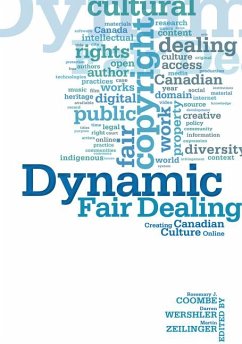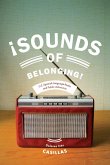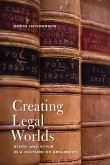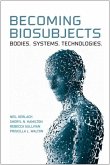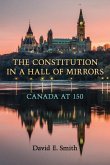Rosemary Coombe, Darren Wershler, Martin Zeilinger
Dynamic Fair Dealing
Creating Canadian Culture Online
Schade – dieser Artikel ist leider ausverkauft. Sobald wir wissen, ob und wann der Artikel wieder verfügbar ist, informieren wir Sie an dieser Stelle.
Rosemary Coombe, Darren Wershler, Martin Zeilinger
Dynamic Fair Dealing
Creating Canadian Culture Online
- Broschiertes Buch
- Merkliste
- Auf die Merkliste
- Bewerten Bewerten
- Teilen
- Produkt teilen
- Produkterinnerung
- Produkterinnerung
Dynamic Fair Dealing presents a range of insightful and provocative essays that rethink our relationship to Canadian fair dealing policy.
Andere Kunden interessierten sich auch für
Dynamic Fair Dealing presents a range of insightful and provocative essays that rethink our relationship to Canadian fair dealing policy.
Produktdetails
- Produktdetails
- Verlag: University of Toronto Press
- Seitenzahl: 456
- Erscheinungstermin: 15. Mai 2014
- Englisch
- Abmessung: 226mm x 152mm x 30mm
- Gewicht: 680g
- ISBN-13: 9781442614413
- ISBN-10: 1442614412
- Artikelnr.: 38139384
- Herstellerkennzeichnung
- Libri GmbH
- Europaallee 1
- 36244 Bad Hersfeld
- gpsr@libri.de
- Verlag: University of Toronto Press
- Seitenzahl: 456
- Erscheinungstermin: 15. Mai 2014
- Englisch
- Abmessung: 226mm x 152mm x 30mm
- Gewicht: 680g
- ISBN-13: 9781442614413
- ISBN-10: 1442614412
- Artikelnr.: 38139384
- Herstellerkennzeichnung
- Libri GmbH
- Europaallee 1
- 36244 Bad Hersfeld
- gpsr@libri.de
Edited by Rosemary J. Coombe, Darren Wershler, and Martin Zeilinger
INTRODUCING Dynamic Fair Dealing: Creating Canadian Digital Culture
Rosemary J. Coombe (York University, Canada Research Chair in Law,
Communication and Culture), Darren Wershler (Concordia University Research
Chair in Media & Contemporary Literature) and Martin Zeilinger (Banting
Postdoctoral Fellow in Law and Culture, York University).
A. THE CANADIAN COPYRIGHT CONTEXT
I. Provocations: Fair Dealing as Right, Speech, Duty, and Practice
1. Copyright and Freedom of Expression: Fair Dealing Between Work and Play
Bita Amani (Queens University, Law School).
2. From the Right to Copy to Practices of Copying
Marcus Boon (York University, English).
II. Recognizing the Canadian Public Domain
3. The Canadian Public Domain: What, Where, and to What End?
Carys Craig (York University, Osgoode Law School).
4. Dynamic Fair Dealing with Orphan Works: Lessons from “Real” Propert
Ren Bucholz (Lenczner Slaght Royce Smith Griffin LLP )
5. Publicly Funded, Then Locked Away: The Work of the Canadian Broadcasting
Corporation
Kyle Asquith (Western University, Information & Media Studies).
III. Infrastructures for Fair Dealing
6. Resisting Enclosure: Licenses, Authorship, and the Commons
John Maxwell (Simon Fraser University, Publishing).
7. Weaving an Open Web: Innovation and Ethics in the Virtual Commons
Eliot Che (Web Designer, Cultural Shifts).
8. “This Content is Not Available in Your Region”: Geo-Blocking Culture in
Canada
Pete Urquhart (Wilfrid Laurier University, Communications) and Ira Wagman
(Carleton University, Journalism & Communication).
9. Net Neutrality and the Threat to Open Cultural Expression
Steve Anderson (OpenMedia.ca).
IV. Experiments in Pedagogy and Diversity
10. Copyright and Access to Media for People with Perceptual Disabilities
J. P. Udo (Ryerson University, Centre for Learning Technologies) and
Deborah Fels (Ryerson University, Centre for Learning Technologies).
11. If You’re Asking, It’s not Fair Dealing: Animating Canadian Copyright
Issues in a ‘Read-Write’ Classroom
Matt Soar (Concordia University, Communications).
12. Hacking Education: How Openness and Sharing Can Transform Learning
Alec V. Couros (IT Coordinator, University of Regina, Faculty of
Education).
B. MEDIATIONS
I. Digital Publishing
13. Open Access Publishing and Academic Research
Rowland Lorimer (Simon Fraser University, Canadian Centre for Studies in
Publishing).
14. Open Access Mandates and the ‘Fair Dealing’ Button
Arthur Sale (University of Tasmania, Computer Science), Marc Couture
(Université du Québec à Montréal, Télé-université), Eloy Rodrigues
(Universidade do Minho, Portugal, Documentation Services), Leslie Carr
(University of Southampton, School of Electronics and Computer Science) and
Stevan Harnad (Université du Quebec à Montreal, Canada Research Chair in
Cognitive Science).
II. Principles and Practices of Heritage Management
15. The Evolution of Cultural Heritage Ethics via Human Rights Norms
Rosemary J. Coombe (Canada Research Chair in Law, Communication and
Culture, York University) Nicole Aylwin (York University, Communication and
Culture).
16. Indigenous Cultural Heritage in the Age of Technological Reproducibility:
Towards a Postcolonial Ethic of the Public Domain
George Nicholas (Simon Fraser University, Anthropology).
17. Cultural Diversity: A Central Dimension of Canadian Cultural Heritage?
Nicole Aylwin (York University, Communication and Culture).
III. The Work of Poetics
18. Parodists' Rights and Copyright in a Digital Canada
Graham Reynolds (Dalhousie University, Law).
19. Robin Hood of the Avant-Garde
Kenneth Goldsmith (University of Pennsylvania, Creative Writing).
20. Remixing bpNichol: 'Direct Dealing' and Recombinatory Art Practices
Justin Stephenson (Trace Pictures Animation and Design).
C. MAKING OUR DIGITAL HERITAGE A DYNAMIC ONE
I. Documenting Pasts and Assessing Virtual Futures
21. Copyright Dramas: Theatre Archives and Collections Online
David Meurer (York University, Communication and Culture).
22. Streaming a Digital Scream: Archiving Toronto’s Barbaric Yawp
Suzanne Zelazo (Ryerson University, English).
23. The NFB, Canada’s Experimental Documentary Tradition and Found Futures
Martin Zeilinger (York University, Communication and Culture) and
ElHorwatt (YorkUniversity, Film and Media).
II. Recombinant Creativity
24. i. Chipmusic, Out of Tune: Crystal Castles and the Misappropriation of
Licensed Sound
Martin Zeilinger (York University, Communication and Culture).
25. 'My Real’ll Make Yours a Rental': Hip Hop and Canadian Copyright
Alexandra Boutros (Wilfrid Laurier University, Cultural Studies).
26. Friction over Fan Fiction
Grace Westcott (Westcott Law, Toronto).
27. Child-Generated Content: Children’s Authorship and Interpretive Practices
in Digital Gaming Cultures
Sara M. Grimes (University of Toronto, Faculty of Information).
AFTERWORD: REFLECTIONS
Deal with it
Laura Murray (Queens University, English).
Pull up the stakes and fill in the ditches: the materiality of intellectual
property
Darin Barney (McGill University, Art History and Communications).
REFERENCES
Rosemary J. Coombe (York University, Canada Research Chair in Law,
Communication and Culture), Darren Wershler (Concordia University Research
Chair in Media & Contemporary Literature) and Martin Zeilinger (Banting
Postdoctoral Fellow in Law and Culture, York University).
A. THE CANADIAN COPYRIGHT CONTEXT
I. Provocations: Fair Dealing as Right, Speech, Duty, and Practice
1. Copyright and Freedom of Expression: Fair Dealing Between Work and Play
Bita Amani (Queens University, Law School).
2. From the Right to Copy to Practices of Copying
Marcus Boon (York University, English).
II. Recognizing the Canadian Public Domain
3. The Canadian Public Domain: What, Where, and to What End?
Carys Craig (York University, Osgoode Law School).
4. Dynamic Fair Dealing with Orphan Works: Lessons from “Real” Propert
Ren Bucholz (Lenczner Slaght Royce Smith Griffin LLP )
5. Publicly Funded, Then Locked Away: The Work of the Canadian Broadcasting
Corporation
Kyle Asquith (Western University, Information & Media Studies).
III. Infrastructures for Fair Dealing
6. Resisting Enclosure: Licenses, Authorship, and the Commons
John Maxwell (Simon Fraser University, Publishing).
7. Weaving an Open Web: Innovation and Ethics in the Virtual Commons
Eliot Che (Web Designer, Cultural Shifts).
8. “This Content is Not Available in Your Region”: Geo-Blocking Culture in
Canada
Pete Urquhart (Wilfrid Laurier University, Communications) and Ira Wagman
(Carleton University, Journalism & Communication).
9. Net Neutrality and the Threat to Open Cultural Expression
Steve Anderson (OpenMedia.ca).
IV. Experiments in Pedagogy and Diversity
10. Copyright and Access to Media for People with Perceptual Disabilities
J. P. Udo (Ryerson University, Centre for Learning Technologies) and
Deborah Fels (Ryerson University, Centre for Learning Technologies).
11. If You’re Asking, It’s not Fair Dealing: Animating Canadian Copyright
Issues in a ‘Read-Write’ Classroom
Matt Soar (Concordia University, Communications).
12. Hacking Education: How Openness and Sharing Can Transform Learning
Alec V. Couros (IT Coordinator, University of Regina, Faculty of
Education).
B. MEDIATIONS
I. Digital Publishing
13. Open Access Publishing and Academic Research
Rowland Lorimer (Simon Fraser University, Canadian Centre for Studies in
Publishing).
14. Open Access Mandates and the ‘Fair Dealing’ Button
Arthur Sale (University of Tasmania, Computer Science), Marc Couture
(Université du Québec à Montréal, Télé-université), Eloy Rodrigues
(Universidade do Minho, Portugal, Documentation Services), Leslie Carr
(University of Southampton, School of Electronics and Computer Science) and
Stevan Harnad (Université du Quebec à Montreal, Canada Research Chair in
Cognitive Science).
II. Principles and Practices of Heritage Management
15. The Evolution of Cultural Heritage Ethics via Human Rights Norms
Rosemary J. Coombe (Canada Research Chair in Law, Communication and
Culture, York University) Nicole Aylwin (York University, Communication and
Culture).
16. Indigenous Cultural Heritage in the Age of Technological Reproducibility:
Towards a Postcolonial Ethic of the Public Domain
George Nicholas (Simon Fraser University, Anthropology).
17. Cultural Diversity: A Central Dimension of Canadian Cultural Heritage?
Nicole Aylwin (York University, Communication and Culture).
III. The Work of Poetics
18. Parodists' Rights and Copyright in a Digital Canada
Graham Reynolds (Dalhousie University, Law).
19. Robin Hood of the Avant-Garde
Kenneth Goldsmith (University of Pennsylvania, Creative Writing).
20. Remixing bpNichol: 'Direct Dealing' and Recombinatory Art Practices
Justin Stephenson (Trace Pictures Animation and Design).
C. MAKING OUR DIGITAL HERITAGE A DYNAMIC ONE
I. Documenting Pasts and Assessing Virtual Futures
21. Copyright Dramas: Theatre Archives and Collections Online
David Meurer (York University, Communication and Culture).
22. Streaming a Digital Scream: Archiving Toronto’s Barbaric Yawp
Suzanne Zelazo (Ryerson University, English).
23. The NFB, Canada’s Experimental Documentary Tradition and Found Futures
Martin Zeilinger (York University, Communication and Culture) and
ElHorwatt (YorkUniversity, Film and Media).
II. Recombinant Creativity
24. i. Chipmusic, Out of Tune: Crystal Castles and the Misappropriation of
Licensed Sound
Martin Zeilinger (York University, Communication and Culture).
25. 'My Real’ll Make Yours a Rental': Hip Hop and Canadian Copyright
Alexandra Boutros (Wilfrid Laurier University, Cultural Studies).
26. Friction over Fan Fiction
Grace Westcott (Westcott Law, Toronto).
27. Child-Generated Content: Children’s Authorship and Interpretive Practices
in Digital Gaming Cultures
Sara M. Grimes (University of Toronto, Faculty of Information).
AFTERWORD: REFLECTIONS
Deal with it
Laura Murray (Queens University, English).
Pull up the stakes and fill in the ditches: the materiality of intellectual
property
Darin Barney (McGill University, Art History and Communications).
REFERENCES
INTRODUCING Dynamic Fair Dealing: Creating Canadian Digital Culture
Rosemary J. Coombe (York University, Canada Research Chair in Law,
Communication and Culture), Darren Wershler (Concordia University Research
Chair in Media & Contemporary Literature) and Martin Zeilinger (Banting
Postdoctoral Fellow in Law and Culture, York University).
A. THE CANADIAN COPYRIGHT CONTEXT
I. Provocations: Fair Dealing as Right, Speech, Duty, and Practice
1. Copyright and Freedom of Expression: Fair Dealing Between Work and Play
Bita Amani (Queens University, Law School).
2. From the Right to Copy to Practices of Copying
Marcus Boon (York University, English).
II. Recognizing the Canadian Public Domain
3. The Canadian Public Domain: What, Where, and to What End?
Carys Craig (York University, Osgoode Law School).
4. Dynamic Fair Dealing with Orphan Works: Lessons from “Real” Propert
Ren Bucholz (Lenczner Slaght Royce Smith Griffin LLP )
5. Publicly Funded, Then Locked Away: The Work of the Canadian Broadcasting
Corporation
Kyle Asquith (Western University, Information & Media Studies).
III. Infrastructures for Fair Dealing
6. Resisting Enclosure: Licenses, Authorship, and the Commons
John Maxwell (Simon Fraser University, Publishing).
7. Weaving an Open Web: Innovation and Ethics in the Virtual Commons
Eliot Che (Web Designer, Cultural Shifts).
8. “This Content is Not Available in Your Region”: Geo-Blocking Culture in
Canada
Pete Urquhart (Wilfrid Laurier University, Communications) and Ira Wagman
(Carleton University, Journalism & Communication).
9. Net Neutrality and the Threat to Open Cultural Expression
Steve Anderson (OpenMedia.ca).
IV. Experiments in Pedagogy and Diversity
10. Copyright and Access to Media for People with Perceptual Disabilities
J. P. Udo (Ryerson University, Centre for Learning Technologies) and
Deborah Fels (Ryerson University, Centre for Learning Technologies).
11. If You’re Asking, It’s not Fair Dealing: Animating Canadian Copyright
Issues in a ‘Read-Write’ Classroom
Matt Soar (Concordia University, Communications).
12. Hacking Education: How Openness and Sharing Can Transform Learning
Alec V. Couros (IT Coordinator, University of Regina, Faculty of
Education).
B. MEDIATIONS
I. Digital Publishing
13. Open Access Publishing and Academic Research
Rowland Lorimer (Simon Fraser University, Canadian Centre for Studies in
Publishing).
14. Open Access Mandates and the ‘Fair Dealing’ Button
Arthur Sale (University of Tasmania, Computer Science), Marc Couture
(Université du Québec à Montréal, Télé-université), Eloy Rodrigues
(Universidade do Minho, Portugal, Documentation Services), Leslie Carr
(University of Southampton, School of Electronics and Computer Science) and
Stevan Harnad (Université du Quebec à Montreal, Canada Research Chair in
Cognitive Science).
II. Principles and Practices of Heritage Management
15. The Evolution of Cultural Heritage Ethics via Human Rights Norms
Rosemary J. Coombe (Canada Research Chair in Law, Communication and
Culture, York University) Nicole Aylwin (York University, Communication and
Culture).
16. Indigenous Cultural Heritage in the Age of Technological Reproducibility:
Towards a Postcolonial Ethic of the Public Domain
George Nicholas (Simon Fraser University, Anthropology).
17. Cultural Diversity: A Central Dimension of Canadian Cultural Heritage?
Nicole Aylwin (York University, Communication and Culture).
III. The Work of Poetics
18. Parodists' Rights and Copyright in a Digital Canada
Graham Reynolds (Dalhousie University, Law).
19. Robin Hood of the Avant-Garde
Kenneth Goldsmith (University of Pennsylvania, Creative Writing).
20. Remixing bpNichol: 'Direct Dealing' and Recombinatory Art Practices
Justin Stephenson (Trace Pictures Animation and Design).
C. MAKING OUR DIGITAL HERITAGE A DYNAMIC ONE
I. Documenting Pasts and Assessing Virtual Futures
21. Copyright Dramas: Theatre Archives and Collections Online
David Meurer (York University, Communication and Culture).
22. Streaming a Digital Scream: Archiving Toronto’s Barbaric Yawp
Suzanne Zelazo (Ryerson University, English).
23. The NFB, Canada’s Experimental Documentary Tradition and Found Futures
Martin Zeilinger (York University, Communication and Culture) and
ElHorwatt (YorkUniversity, Film and Media).
II. Recombinant Creativity
24. i. Chipmusic, Out of Tune: Crystal Castles and the Misappropriation of
Licensed Sound
Martin Zeilinger (York University, Communication and Culture).
25. 'My Real’ll Make Yours a Rental': Hip Hop and Canadian Copyright
Alexandra Boutros (Wilfrid Laurier University, Cultural Studies).
26. Friction over Fan Fiction
Grace Westcott (Westcott Law, Toronto).
27. Child-Generated Content: Children’s Authorship and Interpretive Practices
in Digital Gaming Cultures
Sara M. Grimes (University of Toronto, Faculty of Information).
AFTERWORD: REFLECTIONS
Deal with it
Laura Murray (Queens University, English).
Pull up the stakes and fill in the ditches: the materiality of intellectual
property
Darin Barney (McGill University, Art History and Communications).
REFERENCES
Rosemary J. Coombe (York University, Canada Research Chair in Law,
Communication and Culture), Darren Wershler (Concordia University Research
Chair in Media & Contemporary Literature) and Martin Zeilinger (Banting
Postdoctoral Fellow in Law and Culture, York University).
A. THE CANADIAN COPYRIGHT CONTEXT
I. Provocations: Fair Dealing as Right, Speech, Duty, and Practice
1. Copyright and Freedom of Expression: Fair Dealing Between Work and Play
Bita Amani (Queens University, Law School).
2. From the Right to Copy to Practices of Copying
Marcus Boon (York University, English).
II. Recognizing the Canadian Public Domain
3. The Canadian Public Domain: What, Where, and to What End?
Carys Craig (York University, Osgoode Law School).
4. Dynamic Fair Dealing with Orphan Works: Lessons from “Real” Propert
Ren Bucholz (Lenczner Slaght Royce Smith Griffin LLP )
5. Publicly Funded, Then Locked Away: The Work of the Canadian Broadcasting
Corporation
Kyle Asquith (Western University, Information & Media Studies).
III. Infrastructures for Fair Dealing
6. Resisting Enclosure: Licenses, Authorship, and the Commons
John Maxwell (Simon Fraser University, Publishing).
7. Weaving an Open Web: Innovation and Ethics in the Virtual Commons
Eliot Che (Web Designer, Cultural Shifts).
8. “This Content is Not Available in Your Region”: Geo-Blocking Culture in
Canada
Pete Urquhart (Wilfrid Laurier University, Communications) and Ira Wagman
(Carleton University, Journalism & Communication).
9. Net Neutrality and the Threat to Open Cultural Expression
Steve Anderson (OpenMedia.ca).
IV. Experiments in Pedagogy and Diversity
10. Copyright and Access to Media for People with Perceptual Disabilities
J. P. Udo (Ryerson University, Centre for Learning Technologies) and
Deborah Fels (Ryerson University, Centre for Learning Technologies).
11. If You’re Asking, It’s not Fair Dealing: Animating Canadian Copyright
Issues in a ‘Read-Write’ Classroom
Matt Soar (Concordia University, Communications).
12. Hacking Education: How Openness and Sharing Can Transform Learning
Alec V. Couros (IT Coordinator, University of Regina, Faculty of
Education).
B. MEDIATIONS
I. Digital Publishing
13. Open Access Publishing and Academic Research
Rowland Lorimer (Simon Fraser University, Canadian Centre for Studies in
Publishing).
14. Open Access Mandates and the ‘Fair Dealing’ Button
Arthur Sale (University of Tasmania, Computer Science), Marc Couture
(Université du Québec à Montréal, Télé-université), Eloy Rodrigues
(Universidade do Minho, Portugal, Documentation Services), Leslie Carr
(University of Southampton, School of Electronics and Computer Science) and
Stevan Harnad (Université du Quebec à Montreal, Canada Research Chair in
Cognitive Science).
II. Principles and Practices of Heritage Management
15. The Evolution of Cultural Heritage Ethics via Human Rights Norms
Rosemary J. Coombe (Canada Research Chair in Law, Communication and
Culture, York University) Nicole Aylwin (York University, Communication and
Culture).
16. Indigenous Cultural Heritage in the Age of Technological Reproducibility:
Towards a Postcolonial Ethic of the Public Domain
George Nicholas (Simon Fraser University, Anthropology).
17. Cultural Diversity: A Central Dimension of Canadian Cultural Heritage?
Nicole Aylwin (York University, Communication and Culture).
III. The Work of Poetics
18. Parodists' Rights and Copyright in a Digital Canada
Graham Reynolds (Dalhousie University, Law).
19. Robin Hood of the Avant-Garde
Kenneth Goldsmith (University of Pennsylvania, Creative Writing).
20. Remixing bpNichol: 'Direct Dealing' and Recombinatory Art Practices
Justin Stephenson (Trace Pictures Animation and Design).
C. MAKING OUR DIGITAL HERITAGE A DYNAMIC ONE
I. Documenting Pasts and Assessing Virtual Futures
21. Copyright Dramas: Theatre Archives and Collections Online
David Meurer (York University, Communication and Culture).
22. Streaming a Digital Scream: Archiving Toronto’s Barbaric Yawp
Suzanne Zelazo (Ryerson University, English).
23. The NFB, Canada’s Experimental Documentary Tradition and Found Futures
Martin Zeilinger (York University, Communication and Culture) and
ElHorwatt (YorkUniversity, Film and Media).
II. Recombinant Creativity
24. i. Chipmusic, Out of Tune: Crystal Castles and the Misappropriation of
Licensed Sound
Martin Zeilinger (York University, Communication and Culture).
25. 'My Real’ll Make Yours a Rental': Hip Hop and Canadian Copyright
Alexandra Boutros (Wilfrid Laurier University, Cultural Studies).
26. Friction over Fan Fiction
Grace Westcott (Westcott Law, Toronto).
27. Child-Generated Content: Children’s Authorship and Interpretive Practices
in Digital Gaming Cultures
Sara M. Grimes (University of Toronto, Faculty of Information).
AFTERWORD: REFLECTIONS
Deal with it
Laura Murray (Queens University, English).
Pull up the stakes and fill in the ditches: the materiality of intellectual
property
Darin Barney (McGill University, Art History and Communications).
REFERENCES

